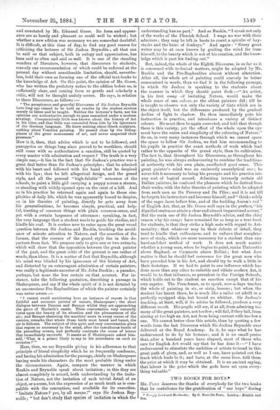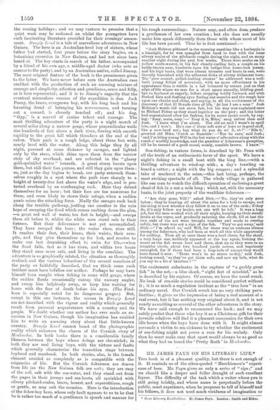TWO BOOKS FOR BOYS.* Mn. FE NN deserves the thanks
of everybody for the two books that he contributes for the gratification of "our boys" during
• Bunyip Land and Menkardoc. By G. Manville Fenn. Louden; BlaCkie and Son.
the coming holidays ; and we may venture to promise that a quiet week may be reckoned on whilst the youngsters have such fascinating literature provided for their evenings' amuse- ment. Bun yip Land is a tale of marvellous adventures in New Guinea. The hero is an Australian-bred boy of sixteen, whose father had started, four years before the story begins, on a botanising excursion in New Guinea, and had not since been heard of. The boy starts in search of his father, accompanied by a friend of his own age, a middle-aged doctor (who acts as mentor to the party), and by an Australian native, called Jimmy. The most original feature of the book is the prominence given to the latter. We have never before seen the Australian race credited with the production of such an amusing mixture of courage and simplicity, affection and greediness, sense and folly, as is here represented; and it is to Jimmy's sagacity that the eventual miraculous success of the expedition is due. Jack Penny, the brave, overgrown boy, with his long back and his haunting dread of betraying his nervousness, and turning out a coward, is cleverly touched off; and his dog, "Gyp," is a marvel of canine talent and courage. The most thrilling adventure of the party is a night march of several miles along a narrow gorge, whose perpendicular walls rise hundreds of feet above a dark river, flowing with smooth rapidity to the great fall which thunders at the end of the caiion. Their path is a rough ledge, about three feet wide, nearly level with the water. Along this ledge they fly all night, pursued at some distance by savages, and lighted only by the stars, which shine upon them from the narrow strip of sky overhead, and are reflected in the "glassy gold-sprinkled water" beneath. A great storm bursts upon them, but still their foes pursue, and still they gain upon them; so, just as the day begins to break, our party entrench them- selves roughly in a spot where the path rises sharply to a height of twenty-five feet above the water's edge, and is pro- tected overhead by an overhanging rock. Here they defend themselves for an hour ; but their foes are too numerous for them, and seem likely to storm their refuge, when a sudden panic seizes the attacking force. Madly the savages rush back along the terrible pathway, jostling one another in the vain hope of escaping the flood which comes rushing down the glen, —a great red wall of water, ten feet in height,—and sweeps them all before it, whilst the white men stand safe in their fortress. But their deliverance is not yet accomplished. They have escaped the bore ; the water rises, rises still. It reaches their feet, their knees, their waists, their arm- pits, and they give themselves up for lost, and resolve to make one last despairing effort to swim for life,—when the flood falls, fast as it has risen, and within two hours they stand once more safe, and living in the sunshine. The adventure is so graphically related, the situation so thoroughly realised, and the various behaviour of the several members of the party so faithfully described, that we think some such incident must have befallen our author. Perhaps he may have himself been caught when fishing in some wild gorge, where the sudden floods occasionally entrap the unwary angler, and sweep him helplessly away, or keep him waiting for hours with the fear of death before his eyes. (The Find. horn is especially noted for its dangerous gorges.) But, except in this one instance, the scenes in Bun yip Land are not described with the vigour and reality which generally result from personal acquaintance with a country and its people. We doubt whether our author has ever made an ex- cursion in New Guinea, though his imagination has enabled him to write an amusing story about that little-known country. Bunyip Land cannot boast of the photographic reality which enhances the charm of the Cornish story of Menharcloc. In both books there is a considerable family likeness between the boys whose doings are chronicled; in both they are real living boys, with the virtues and faults which generally characterise the transition stage between boyhood and manhood. In both stories, also, is the female element avoided as completely as is compatible with the exigencies of life. Bat the Cornish fishermen are drawn from life (as the New Guinea folk are not); they are racy of the soil, salt with the sea-water, and they stand out from the pages in their jerseys and sea-boots, all sprinkled with silvery pilchard-scales, brave, honest, and superstitious, rough or gentle, as may suit the occasion. Here is the introduction of the fisher-boy hero, whose only fault appears to us to be that he is rather too much of a gentleman in speech and manner for his rough surroundings. Nature may, and often does, produce a gentleman of her own creation ; but she does not usually make him speak differently from those with whom most of his life has been passed. Thus he is first mentioned
" Josh Helston glittered in the morning sunshine like a harlequin in a limelight, for he was spangled from head to foot with the loose silvery scales of the pilchards caught during the night, and on many another night during the past few weeks. There were scales on his yellow south-wester, in his fair closely-curling hair, a couple on his ruddy-brown nose, hundreds upon his indigo-blue home-knit jersey, and his high boots, that were almost trousers and boots in one, were literally burnished with the adherent disks of silvery iridescent horn. The poor smooth, gallish-looking creatur ' he addressed was a well- built young fellow of seventeen, with no more effeminacy in his appearance than is visible in a lad balanced by nature just on that edge of life where we rest for a short apace uneasily, bidding good- bye to boyhood so eagerly, before stepping boldly forward, and with flushed face and flashing eyes feeling our muscles and the rough hair upon our cheeks and chins, and saying, in all the excitement of the discovery of that El Dorado time of life, 'At last I am a man !' Josh Helston's words did not seem fair, but his way was explained once to Michael Polree as they stood together on the pier ; and the latter had expostulated after his fashion, for he never spoke much, by say- ing: 'Easy, mate, easy.'—' Easy it is, Mike,' sang rather than said Josh. I know what I'm about. The old nn said I wasn't to spoil him, and I won't. He's one o' them soft sort o' boys as is good stuff, like a new-bred net ; but what do you do wi' it, eh ?'—' Bile it,' growled old Mike, Catch or Gambier.'—' Toe be sure,' said Josh ; and I'm biling young Will in the hot water o' ad versitee along with the catch o' worldly knowledge, and the gambier o' fisherman's gumption, till he be tanned of a good moral, manly, sensible brown. I know.'"
Sea-fishing, in various forms, is described by Mr. Fenn with all the truth of an enthusiastic lover of the sport. We have a night's fishing in a small boat with the long line,—with a thrilling adventure to wind-up with ; a day's trawling on board a cutter ; a night with the big congers ; and a splendid take of mackerel in the seine,—this last being, perhaps, the most exciting spectacle of all. The whole village is gathered like one man to watch the difficult operation of enclosing a great shoal of fish in a net a mile long ; which net, with the necessary boats, is the joint property of the wealthier fishermen :—
"'Are they gone, Will ? ' asked Dick.—' No, they've only gone below; they're hunting all about the seine for a hole to escape, and the thing is now whether they follow it on to one of the ends ; if they do, it's only follow my leader, not one will be left.' It was a long job, but the men worked with all their might, keeping up their steady strain at the ropes, and gradually reducing the circle, till at last the two ends• of the net were brought together and made to overlap safely, bat there was not a sign of the fish. They've got away,' said .Dick.—' I'm afraid so,' said Will, for there was an ominous silence among the fishermen, who had been at work all this while apparently for nothing. Then all at once there was a loud cheer, for the shoal, a very large one, suddenly appeared at the top again, fretting the water as the fish swam here and there, shut up as they were in an irregular circle, about two hundred yards across, and hopelessly entangled, for if there had been a loop-hole of escape they would have found it now. There won't be no storm to-day,' said Josh, looking round, so they've got them safe, and now my lads, what do you say to a bit o' brexfass ? ' "
The excitement culminates in the capture of "a gashly great fish" in the net,—a blue shark, "eight feet of mischief," as he is described by his captors. Of course, we have the usual wreck. No book of sea-side stories could be considered perfect without it ; it is as much a regulation incident as the "true love" in an ordinary novel. Our Cornish wreck has no very striking pecu- liarities; it gives us the impression of being a real account of a real event, but it has nothing very original about it, and is not nearly as exciting as several of the other adventures in the story. We have said enough to recommend the book; and we may safely predict that those who buy it as a Christmas gift for their juvenile relatives will find it a pleasant companion for their own idle hours when the boys have done with it. It might almost persuade a victim to sea-sickness to try whether the excitement of sea-fishing might not prove a cure for his malady. Only then he must make sure that sport would always be as good as what they had on board the Pretty Ruth' in Menhardoc.



































 Previous page
Previous page